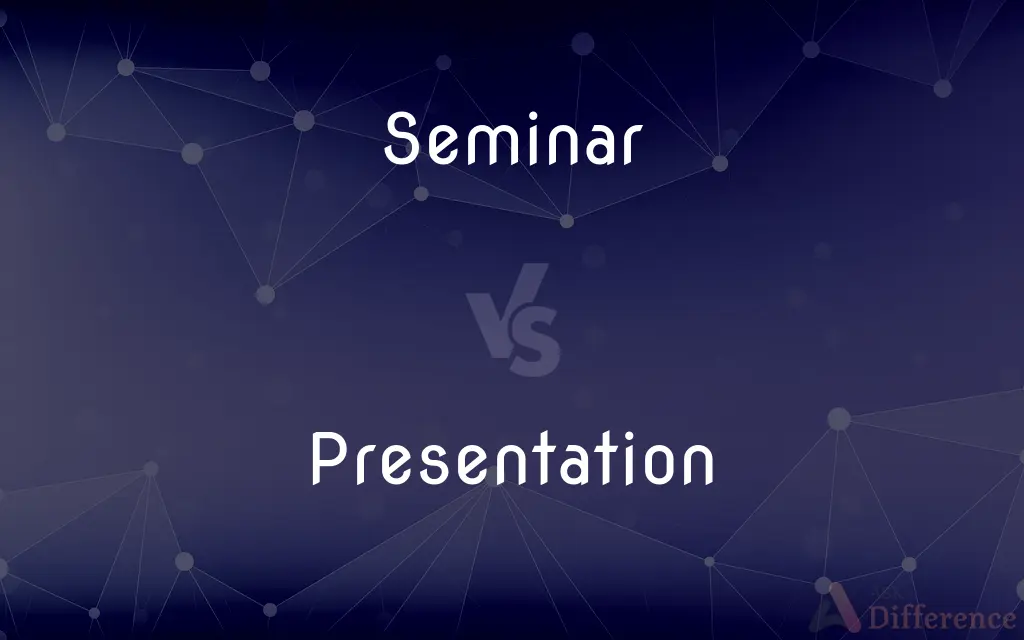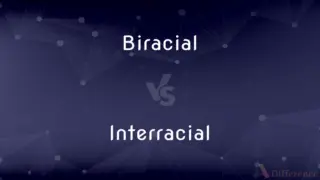Seminar vs. Presentation — What's the Difference?
Edited by Tayyaba Rehman — By Maham Liaqat — Updated on March 9, 2024
A seminar is an interactive meeting for discussion or training, involving multiple participants, while a presentation is a structured delivery of content by one or more speakers to an audience, focusing on information sharing.

Difference Between Seminar and Presentation
Table of Contents
ADVERTISEMENT
Key Differences
Seminars are typically more interactive and collaborative, involving discussions, question-and-answer sessions, and sometimes group work. These meetings are designed to delve deeper into specific topics, often with the aim of educational enhancement, skill development, or professional training. Presentations, on the other hand, are more about the one-way delivery of information, where a speaker or speakers present on a particular subject to an audience, with limited audience interaction except perhaps for a brief question-and-answer period at the end.
While seminars often have a longer duration, possibly spanning several hours to a few days, to cover topics in depth and allow for interaction, presentations are generally shorter, ranging from a few minutes to a couple of hours. This makes presentations suitable for briefings, lectures, or showcasing ideas or findings, whereas seminars are more conducive to comprehensive learning and discussion.
The audience size and composition differ between the two as well. Seminars usually cater to smaller groups, which allows for a more personalized and interactive experience. Participants in a seminar often have a specific interest in the topic or are looking to enhance their skills in a particular area. Presentations can be tailored to both small and large audiences and are often used to inform or persuade, without necessarily expecting significant input from the audience.
Technology plays a role in both formats, with presentations often relying heavily on visual aids like slideshows (e.g., PowerPoint presentations) to support the speaker’s delivery. Seminars may also utilize technology, but the focus is on facilitating interaction among participants, such as through video conferencing tools for virtual seminars or interactive polls and workshops.
The goal of a seminar is usually educational, aimed at teaching or exploring a subject in detail, promoting collaborative learning among participants. Presentations aim to inform, persuade, or present research findings, with the primary objective being to convey information from the speaker to the audience effectively.
ADVERTISEMENT
Comparison Chart
Purpose
Educational, interactive
Informative, persuasive
Duration
Longer, hours to days
Shorter, minutes to hours
Audience Interaction
High, with discussions
Limited, mainly one-way communication
Audience Size
Typically smaller
Can vary, often larger
Format
Interactive sessions, workshops
Structured talk, visual aids
Technology Use
For interaction (e.g., polls)
For supporting delivery (e.g., slides)
Goal
Deep learning, skill enhancement
Information sharing, persuasion
Compare with Definitions
Seminar
A meeting for discussion or training on a specific topic.
The university hosted a seminar on renewable energy trends.
Presentation
Can be delivered to inform, persuade, or inspire the audience.
The motivational speaker’s presentation left the audience inspired.
Seminar
Aimed at educational enhancement or professional development.
She attended a seminar to improve her digital marketing skills.
Presentation
A speech or talk in which a new idea or piece of work is shown and explained.
He gave a presentation on the company’s quarterly earnings.
Seminar
Can be a part of academic or professional training programs.
The seminar on ethics is a mandatory part of the medical residency program.
Presentation
Designed to convey information effectively, with limited interaction.
The product presentation was followed by a brief Q&A session.
Seminar
Often involves interactive elements like workshops.
The seminar included a workshop on practical solar panel installation.
Presentation
Often uses visual aids like slides to support the information being presented.
Her presentation included a slideshow with graphs and data analytics.
Seminar
Encourages participation and collaboration among attendees.
Participants in the seminar engaged in a group project on sustainability.
Presentation
Suitable for a variety of settings, from academic to business environments.
The scientist shared her research findings through a presentation at the conference.
Seminar
A seminar is a form of academic instruction, either at an academic institution or offered by a commercial or professional organization. It has the function of bringing together small groups for recurring meetings, focusing each time on some particular subject, in which everyone present is requested to participate.
Presentation
(obstetrics) position of the fetus in the uterus relative to the birth canal;
Cesarean sections are sometimes the result of abnormal presentations
Seminar
A course of study for a small group of students in a college or graduate school, often entailing research under the guidance of a professor.
Presentation
A presentation conveys information from a speaker to an audience. Presentations are typically demonstrations, introduction, lecture, or speech meant to inform, persuade, inspire, motivate, build goodwill, or present a new idea/product.
Seminar
The group of students in such a course.
Presentation
The action of presenting something
The presentation of awards.
Seminar
A scheduled meeting of such a group.
Presentation
The style or manner with which something is offered for consideration or display
"These truths are not amenable to scientific presentation" (Karen Armstrong).
Seminar
A meeting for an exchange of ideas; a conference.
Presentation
A theatrical or cinematic production.
Seminar
A class held for advanced studies in which students meet regularly to discuss original research, under the guidance of a professor.
Presentation
A demonstration, lecture, or speech
Gave a presentation on drug abuse.
Seminar
A meeting held for the exchange of useful information by members of a common business community.
Presentation
A formal introduction of someone to others, as at court.
Seminar
A group of students engaged, under the guidance of an instructor, in original research in a particular line of study, and in the exposition of the results by theses, lectures, etc.; - formerly called also seminary, now seldom used in this sense.
Presentation
(Ecclesiastical) The act or right of naming a cleric to a benefice.
Seminar
Any meeting for an exchange of ideas
Presentation
The position of the fetus in the uterus at birth with respect to the mouth of the uterus.
Seminar
A course offered for a small group of advanced students
Presentation
A symptom or sign or a group of symptoms or signs that is evident during a medical examination
The patient's presentation was consistent with a viral illness.
Presentation
The fact of being evident or manifest. Used of a disease or condition
The presentation of thyroid disease during pregnancy.
Presentation
The act of presenting, or something presented.
Presentation
A dramatic performance.
Presentation
An award given to someone on a special occasion.
Presentation
Money given as a wedding gift.
Presentation
A lecture or speech given in front of an audience.
Presentation
(medicine) The symptoms and other possible indications of disease, trauma, etc., that are exhibited by a patient who has sought, or has otherwise come to, the attention of a physician.
The presentation of the thirty-four-year-old male in the emergency room was slight fever, dilated pupils, and marked disorientation.
Presentation
(medicine) The position of the foetus in the uterus at birth.
Presentation
(mainly LGBT) Gender presentation; gender expression.
Presentation
(fencing) Offering one's blade for engagement by the opponent.
Presentation
(mathematics) The specification of a group by generators and relators.
Presentation
The act or right of offering a clergyman to the bishop or ordinary for institution in a benefice.
Presentation
(immunology) The preparation of antigen fragments during the immune response.
Presentation
The act of presenting, or the state of being presented; a setting forth; an offering; bestowal.
Prayers are sometimes a presentation of mere desires.
Presentation
Exhibition; representation; display; appearance; semblance; show.
Under the presentation of the shoots his wit.
Presentation
That which is presented or given; a present; a gift, as, the picture was a presentation.
Presentation
The act of offering a clergyman to the bishop or ordinary for institution in a benefice; the right of presenting a clergyman.
If the bishop admits the patron's presentation, the clerk so admitted is next to be instituted by him.
Presentation
The particular position of the child during labor relatively to the passage though which it is to be brought forth; - specifically designated by the part which first appears at the mouth of the uterus; as, a breech presentation.
Presentation
The activity of formally presenting something (as a prize or reward);
She gave the trophy but he made the presentation
Presentation
The act of making something publicly available; presenting news or other information by broadcasting or printing it;
He prepared his presentation carefully in advance
Presentation
A show or display; the act of presenting something to sight or view;
The presentation of new data
He gave the customer a demonstration
Presentation
The act of presenting a proposal
Presentation
A visual representation of something
Presentation
Formally making a person known to another or to the public
Common Curiosities
What is the main difference between a seminar and a presentation?
The main difference is the level of interaction; seminars are interactive and educational, while presentations focus on conveying information with limited audience participation.
Which is more suitable for in-depth learning?
Seminars are more suitable for in-depth learning due to their interactive and comprehensive nature.
How do audience sizes typically compare?
Seminars usually cater to smaller groups to facilitate interaction, while presentations can be tailored for both small and large audiences.
Can technology be used in both seminars and presentations?
Yes, technology is used in both formats but with different focuses; in seminars for facilitating interaction and in presentations for supporting delivery.
Can a presentation be part of a seminar?
Yes, presentations can be part of seminars as a way to introduce topics or provide information before engaging in discussions or workshops.
What skills are needed to deliver an effective presentation?
Effective presentation skills include clear communication, engagement techniques, and the ability to use visual aids effectively.
Is it necessary to interact with the audience during a presentation?
While not necessary, interacting with the audience can enhance engagement and ensure the message is received effectively.
How can one prepare for a seminar?
Preparing for a seminar may involve researching the topic, preparing questions, and being ready to participate in discussions and activities.
Can seminars be held virtually?
Yes, virtual seminars are common, especially in contexts where in-person meetings are not feasible, utilizing video conferencing tools to maintain interactivity.
Are seminars only for educational purposes?
While seminars are often educational, they can also be used for professional training, development, and networking.
How long does a typical seminar last?
Seminars can last from several hours to a few days, allowing for detailed exploration of the subject matter.
Can presentations be interactive?
Presentations can include interactive elements like Q&A sessions, but the interaction is generally more limited compared to seminars.
Is a presentation always formal?
Presentations can range from formal to informal, depending on the setting and audience, but they typically maintain a structured format.
What makes a seminar effective?
An effective seminar promotes active participation, fosters learning, and encourages collaboration among participants.
Why are visual aids important in presentations?
Visual aids can enhance understanding, maintain audience interest, and support the speaker’s points by illustrating complex information visually.
Share Your Discovery

Previous Comparison
Artisanal vs. Handmade
Next Comparison
Biracial vs. InterracialAuthor Spotlight
Written by
Maham LiaqatEdited by
Tayyaba RehmanTayyaba Rehman is a distinguished writer, currently serving as a primary contributor to askdifference.com. As a researcher in semantics and etymology, Tayyaba's passion for the complexity of languages and their distinctions has found a perfect home on the platform. Tayyaba delves into the intricacies of language, distinguishing between commonly confused words and phrases, thereby providing clarity for readers worldwide.














































